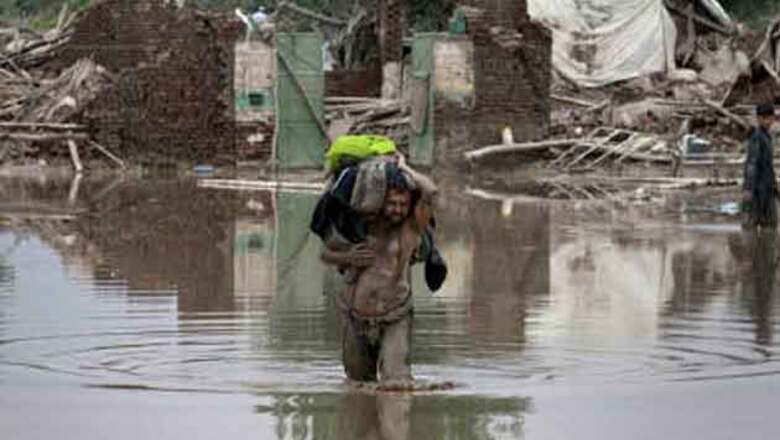
views
Rohri: Speaking on the floods in Pakistan, Prime Minister Yusuf Raza Gilani told reporters on a visit to Sukkur, in Sindh province, "our country has gone back several years."
"This is unprecedented ... it's beyond imagination, it's beyond expectations," he added.
Pakistani navy boats travelled along kilometres of flood waters on Sunday to rescue people stranded in a disaster that has angered many over the government's response.
The worst floods in 80 years have killed over 1,600 people, disrupted 12 million lives, washed away crops and farm animals and overwhelmed President Asif Ali Zardari's civilian government.
The military, which has maintained a dominant role in foreign and security policy even during civilian rule, is leading Pakistani relief efforts, as it has done in past crises like the 2005 earthquake.
Analysts do not expect the government's poor handling of the crisis to encourage the military, which has ruled the country for more than half of its history, to try to seize power.
But more homes and crops are likely to be swept away with heavy rain forecast to lash the country in the next 24 to 36 hours.
Rubber and wooden navy boats set out from areas in Sindh province, where flood waters burst from the Indus River across vast distances, to help Pakistanis who have watched safe ground shrink by the hour and waters swallow up their livestock.
"We have been doing this for several days," said navy officer Akhter Mahmood after his boat travelled through about 20 kilometres of flood water.
Zardari drew heavy criticism for leaving the country for official visits in Europe during the crisis. He has said the prime minister was handling the crisis and reporting developments to him.
Even though relief efforts may have improved the military's standing, and widened the perception that Pakistani civilian governments are too weak and inefficient to cope with disasters, analysts don't see any threat to the current administration.
The army is busy fighting Taliban insurgents and does not want to be strapped with Pakistan's enormous problems – from costly rebuilding after the floods to the struggle to attract foreign investment in a troubled economy to widespread poverty.
"I don't think they are willing to dump Zardari," said Kamran Bokhari, Regional Director, Middle East and South Asia at a global intelligence firm.
The current army leadership ... is very clear that there is a war that needs to be waged."
Foreign aid organisations, also playing a much bigger role than the government, say weather has hampered relief efforts and the floods have wiped out some of their supplies.
Floodwaters have roared down from as far away as Afghanistan and India through the northwest to the agricultural heartland of Punjab and on to southern Sindh along a trail more than 1,000 km (600 miles) long.
In some areas only the tops of trees and telephone poles are visible.
Pakistanis are stuck on the rooftops of their homes. Some fighting to hold on to anything they can walk waist-deep in water carrying logs from their shattered homes.
Saleh Farooqui, director general of the National Disaster Management Authority in Sindh province, said up to 10,000 people were evacuated by the military overnight in Punjab province, and several thousand in Sindh.
In Punjab, hundreds of people were evacuated from drenched areas to a railway track on higher ground.
"What we are wearing is all that we have, the rest is all gone – our house, animals, wheat we had stored, everything has been destroyed," university student Fiza Batool said as she fed her 10-year-old sister biscuits.
Flooding has also taken a toll over the border in the Indian state of Jammu and Kashmir, where rain was hampering rescue and relief efforts. Flash floods have killed at least 132 people in the Himalayan region of Ladakh.
Mudslides engulfed a town in northwest China on Sunday, killing at least 127 people and leaving 2,000 residents missing as rescue teams dug through crushed homes and readied a blast to dislodge debris blocking a river.




















Comments
0 comment